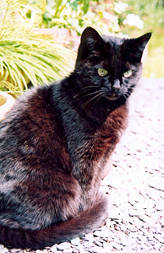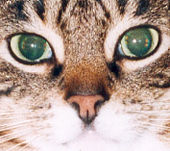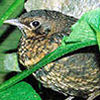It's not pleasant when your cat brings you a dead bird - though the cat thinks it's bringing you a lovely "gift". Many cats do kill birds and other garden creatures, and I've been criticised by one visitor for, as they saw it, playing down this problem.
On behalf of Spike, who died in 2003, aged 14, I must defend cats. Not all cats are hunters, and older cats often don't bother to chase their food, preferring to get it out of a tin, served to them by their tame human.
It depends on the cat in question, then, and probably its age, but also there's some responsibility on cat owners. Cat care charities and bird charities recommend, for example, that cats are kept in at night.
I have seen populations of all bird species locally growing year by year. Though incidents of the cats catching birds are upsetting, they are relatively rare, and bird numbers continue to grow, suggesting that even Rosie's hunting prowess has little impact on the overall population.
Dangerous times - fledglings in spring
Springtime into early summer is probably the most dangerous time, as the fledgling birds just out of nests spend a lot of time on the ground. When there have been nests in our garden I've been aware of this and so have noticed when the fledgling birds appear. I've kept the cats inside as much as possible for the crucial first few days, until the young birds get better at getting themselves off the ground.
If I know there are fledglings about I usually have a quick stroll around
the garden before the cats come out, and I often find fledglings dashing
for cover, or making their rather clumsy flights upwards to more protected
places. Once I've startled them by my appearance, they're less likely
to be sitting around unwarily, a sitting target for the cat who comes
out into the garden after me.
Nests are sometimes built in vulnerable places, but I've found that it
is often possible to block points where a cat could climb. (This of course had to be done quietly and carefully, so as not
to disturb the nearby nest, which would have rather defeated the object
of the whole thing.)
In defence of cats
We have to remember that cats used to be helpful to us, in catching rodents, in an environmentally-friendly and natural way. As we domesticated them, we used them for this purpose. Now we employ Rentokil or some other pest control company, whose methods of extermination are no doubt far more unpleasant.
Rosie catches mice - the field mice that seem to have taken up residence at intervals. My sentimental feelings aside, I have to remember, as we all should, that cats used to be useful to us for their rodent-killing skills, and that we can't expect them to change into non-hunters just because it upsets us when they kill birds.
I think it's overstating the case to suggest, as some seem to do, that domesticated cats are all on the prowl all day constantly looking for prey. One website I looked at said that a cat would catch 40 animals a year. There must be some very busy hunting cats out there making up numbers in this average, on behalf of the many older cats who can't be bothered.
Spike the cat and other cats like him need to be defended from the accusations of those who have never owned a cat, never loved one, and never watched their behaviour properly. And we owners of cats need to do our bit, and think about our responsibilities and do our best to keep bird casualties to a minimum.
Links to useful sites
Feline
Advisory Bureau
- an excellent site, with lots of helpful factsheets available online

Above: Rosie the cat, summer 2002.
Top left: Young blackbird hiding under the leaves of a comfrey plant.

Above: Spike the cat, not interested in bird-bothering.

